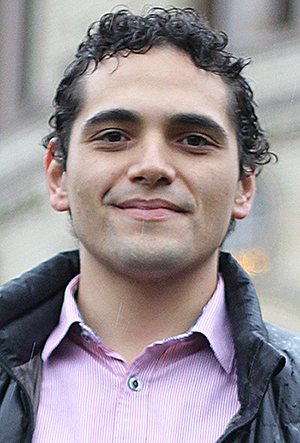
Guatemala Conference: Miguel Zamora-Mills
USC Shoah Foundation Center for Advanced Genocide Research will host the international conference “A Conflict? Genocide and Resistance in Guatemala,” at the University of Southern California, Sept. 11-14, 2016. The scholars profiled in this series were each selected to present their research at the conference.
As a 2014 graduate of Tufts University, Miguel Zamora-Mills is one of the youngest scholars selected to present at the Center’s Guatemala conference.
Zamora-Mills will share his research on the querrellante adhesivos, or “adherent plaintiffs,” of the trials brought forth in Guatemala against genocide perpetrators. Querrellante adhesivos are a unique element in Guatemalan transitional justice; they are people or organizations that join themselves to the legal case to work alongside the public prosecutor, acting as a collaborator, advocate, and check to the State’s actions in the investigation and trial.
Zamora-Mills argues that querrellante adhesivos are important for Guatemalan genocide survivors’ healing process. When survivors are involved in a case as adherent plaintiffs, it allows them to remain involved and informed on legal proceedings, have their voice heard, and resist the threat of impunity and further corruption. It also helps victims of other massacres and forced disappearances to appropriate the sentence in their own healing and reconciliation process.
“The legal figure of querrante adhesivos isn’t something that exists in the U.S. and common law systems,” Zamora-Mills said. “The way the Guatemalan justice system is, it created an opportunity for them to become such central players in the case.”
Zamora-Mills is familiar with the research of many of his fellow conference-goers – who he considers to be the preeminent authorities on the genocide in Guatemala – and said he is looking forward to hearing what each of them present. He will be on a panel with Ricardo Falla, an anthropologist and Jesuit priest, and Ana Maria Mendez Dardon, a Guatemalan lawyer now based in Canada.
“I think it’ll be nice to take a more academic look at it and a more long-term and multi-disciplinary view of the case, to reflect on it,” Zamora-Mills said. “I’m really surprised and humbled that I get to participate in an event with so many really wonderful people.”
By hosting an international conference about the Guatemalan Genocide, Zamora-Mills said USC Shoah Foundation is bringing much-needed respect and attention to the conflict, which is still denied by many Guatemalans and others around the world.
“The annulment of the sentence [of General Rios Montt] has been a huge setback. This conference really helps to cement in an international conversation that no, this really did happen,” Zamora-Mills said. “Having [the conference] at such a recognized foundation really helps bring [the Guatemalan genocide] into the internationally recognized group of cases which is really important. It will return to Guatemala a lot of strength.”